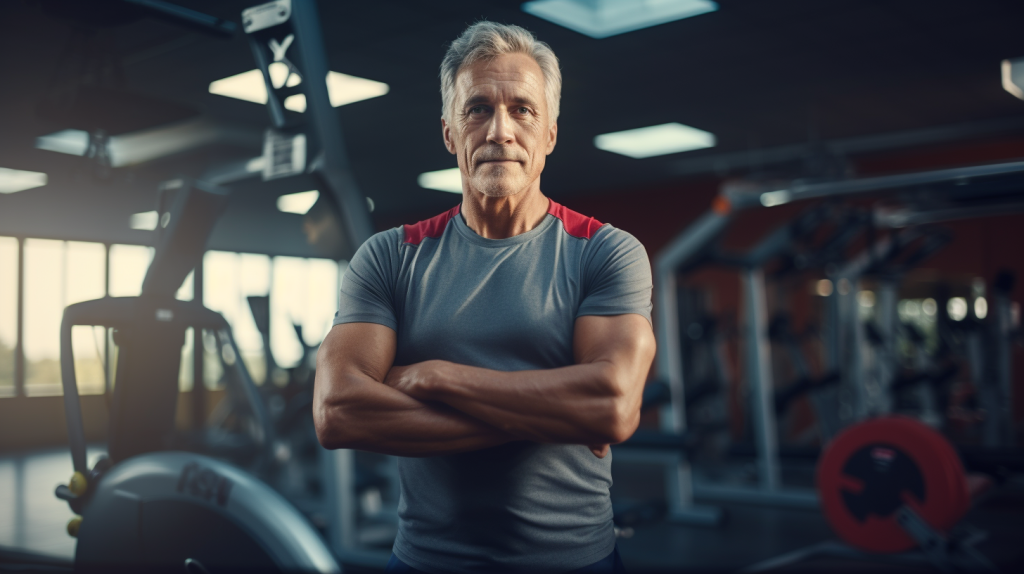Geschatte leestijd: 3 minuten
Recent British research has shown that regular exercise prevents many of the effects of aging. For example, the ‘male menopause’ can be prevented.
Aging and the ‘male menopause’
The ‘male menopause’ refers to the decrease in muscle mass and testosterone and increase in fat mass that often accompanies aging. Also known as ‘penopause’, ‘andropause’, or ‘male menopause’. From about 40 years old, men can take this into account. Something I mention with tempered enthusiasm since I am 41. So far, I haven’t noticed anything, but I seriously consider that everything will become ‘a bit less’ soon.
“Not necessary,” say the researchers from the University of Birmingham and King’s College London. They found that these effects had not occurred in 125 amateur cyclists aged 55 to 79 years (81 men and 41 women). All male participants in their study had to be able to cycle 100 km within 6.5 hours. For women, it was required to cover 60 km in 5.5 hours. Smokers, heavy drinkers, and people with high blood pressure were excluded.
They underwent a series of tests in the laboratory and were compared with a group of adults who were not physically active. This control group consisted of 75 healthy individuals aged 57 to 80 and healthy young individuals aged 20 to 36 years.
The research showed that the loss of muscle mass and strength had not occurred in people who exercised regularly. The cyclists had not experienced an increase in body fat or elevated cholesterol. The testosterone levels in men had remained high, suggesting that they had avoided most of the male menopause.
‘Optimal aging’
An even more striking result was that the benefits went beyond maintaining muscle mass and testosterone. The cyclists also had an immune system that did not seem to age. An organ called the thymus, or sweetbread, is an organ that produces T cells. From the age of 20, this organ begins to shrink and produces fewer T cells. However, in this study, it was found that the thymus of the cyclists produced as many T cells as those of the younger individuals in the control group.
Hippocrates is hip this month. Yesterday, Hippocrates was referred to with the statement that food is like medicine. Probably referring to the quote: “Let food be thy medicine and medicine be thy food.” Although it is doubted whether this is actually a quote from Hippocrates, he seems to have said a lot about the benefits of healthy eating. But he would also have seen exercise as medicine, a point that the British mention. They point out that his message is heard less and less in an increasingly sedentary population.
However, importantly, our findings debunk the assumption that ageing automatically makes us more frail
Our research means we now have strong evidence that encouraging people to commit to regular exercise throughout their lives is a viable solution to the problem that we are living longer but not healthier.
They therefore hope that their findings will help prevent us from automatically linking old age, weakness, and disease. Preventing that life in old age is merely endured and not enjoyed.
According to the researchers, the conclusions show that the cyclists do not cycle because they are healthy, but are healthy because they cycle for a large part of their lives. Their bodies would have been able to ‘age optimally’ as a result.
Compulsory cardio?
Well, I said that I might not have to worry, but that’s not entirely true. After all, I don’t cycle 100 km in 6.5 hours, I don’t cycle at all. In fact, I don’t do any cardio, just strength training.
The researchers acknowledge that not everyone has the endurance of the cyclists and that an activity should be chosen that suits you. I totally agree with that. However, they do not tell to what extent such a background in endurance sports is necessary for the benefits seen in this study.
Fortunately, however, we have already seen enough studies with a similar preserving effect on muscle mass and testosterone through strength training. However, I have not seen any studies demonstrating a positive effect of strength training on the number of T cells in later life.
So maybe I should start doing some cardio after all and not wait until my six-pack suddenly disappears.
Sources:
- Ross D. Pollock, Katie A. O’Brien, Lorna J. Daniels, Kathrine B. Nielsen, Anthea Rowlerson, Niharika A. Duggal, Norman R. Lazarus, Janet M. Lord, Andrew Philp, Stephen D. R. Harridge. Properties of the vastus lateralis muscle in relation to age and physiological function in master cyclists aged 55-79 years. Aging Cell, 2018; e12735
- Duggal et al. Major features of Immunesenescence, including Thymic atrophy, are ameliorated by high levels of physical activity in adulthood. Aging Cell, 2018
- https://onlinelibrary.wiley.com/doi/full/10.1111/acel.12735

